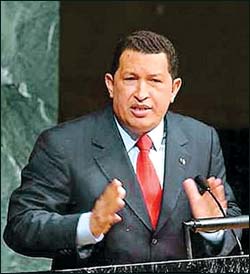The Honduran Coup is the Caribbean’s business
On April 11, 2002, Venezuela’s President Hugo Chávez was briefly
removed from office by an abortive coup d’ etat. A documentary on this
episode, The Revolution Will Not Be Televised, shows how an alliance of
big business, wealthy landowners, and elements of the military conspired
to remove him, with the active support of the Bush Administration and
the local and international media.
False stories
State-owned TV stations were closed, coverage of pro-Chavez
demonstrations was blanked and false stories circulated. Fortuitously,
on the day of the coup, an Irish television crew happened to be inside
the Presidential Palace making a documentary and the end-result was a
film that offers an alternate and compelling viewpoint to the pro-coup
stories.
|

President Hugo Chávez |
It documented the pro-poor policies of the Government, the fact that
it had been democratically elected and enjoyed extensive support among
the working poor, it refuted the lie that Chávez had resigned and
revealed that he was being held prisoner, and showed the massive street
demonstrations in his support.
There are disturbing parallels with Honduras, where on the morning of
June 28, the incumbent President Manuel Zelaya, democratically elected
in 2006 , was taken prisoner by soldiers and put on a plane to
neighbouring Costa Rica, a forged letter of resignation was produced and
the President of the National Assembly, Robert Micheletti, proclaimed
President.
Honduras, a Central American nation of seven million people that
recently overtook Guyana as the third poorest country in the hemisphere,
still exhibits the deep racial and class inequalities that are a legacy
of Spanish conquest and colonisation of the indigenous majority.
75 percent of the people live in poverty, while the top 10 percent of
the population gets 45 percent of the national product (Background to
the Honduran coup: Poverty, exploitation and imperialist domination, by
Rafael Azul). The unemployment rate is 30 percent and the average
working day for adult men and women is 14 hours. Around 30,000 employees
in the maquiladora (export assembly) plants have reportedly lost their
jobs since the onset of the global economic crisis.
Popular demands
Manuel Zelaya, himself a wealthy landowner, had angered the Honduran
business elite and military by moving increasingly to the left during
his presidency, raising the minimum wage by 60 percent, reducing fuel
prices in response to popular demands, and most controversially, taking
Honduras into the Venezuelan-led ALBA (Bolivarian Alternative for the
Americas. His plan to hold a non-binding referendum was the trigger of a
series of events which led to his ouster.
Contrary to widespread media reports, the June 28 Referendum was not
about extending Zelaya’s term of office. The actual question on the
aborted June 28 ballot read, “Do you think that the November 2009
general elections should include a fourth ballot box in order to make a
decision about the creation of a National Constitutional Assembly that
would approve a new Constitution?”, “Yes” or “No.”?
Extend his rule
To quote Mark Weisbrot, Director of the Washington-based Centre for
Economic Policy and Research writing on July 8 for the London Guardian,
“There was no way for Zelaya to “extend his rule” even if the referendum
had been held and passed, and even if he had then gone on to win a
binding referendum on the November ballot.
The June 28 referendum was nothing more than a non-binding poll of
the electorate, asking whether the voters wanted to place a binding
referendum on the November ballot to approve a redrafting of the
country’s constitution. If it had passed, and if the November referendum
had been held (which was not very likely) and also passed, the same
ballot would have elected a new president and Zelaya would have stepped
down in January”.
What was launched, therefore, appears to have been a pre-emptive
strike by the Honduran elite in an attempt to thwart Zelaya’s plans to
deepen the democratic process in a country that has historically
excluded the poor and indigenous majority from effective participation
in social and economic life, a process similar to that underway in
Venezuela, Bolivia and Ecuador.
An inadvertent revelation of inbred racism and classism of this class
was the statement by Enrique Ortez Colindres, named as interim Foreign
Minister, dismissing US President Obama as a ‘little black man [who]
doesn’t know where Tegucigalpa is’. A lukewarm apology was proffered,
but a further remark by Colindres surfaced which translated reads ‘I
have negotiated with queers, prostitutes, leftists, blacks, whites.
Por Norman Girvan, Andaiye and Alissa Trotz |



